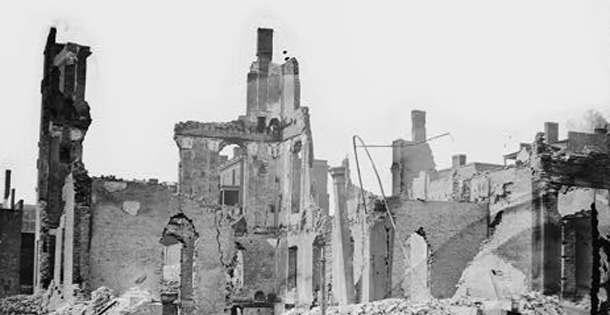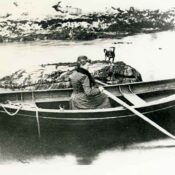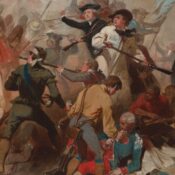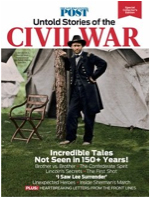
This article and other stories of the Civil War can be found in the Post’s Special Collector’s Edition, The Saturday Evening Post: Untold Stories of the Civil War.
—This account appeared in the October 1, 1864, issue of The Saturday Evening Post.
It may seem superfluous to dwell upon a theme that everybody knows by heart. Hospital scenes have been recorded until all are familiar with them — but if you will permit me, reader, I will throw the door open upon another phase of life, and if you can look on unmoved, with no stirrings of divine pity and sympathy — I will not be your judge.
The headquarters of the ——— Army Corps was a large, beautiful building, and we took possession of it in the spring of ‘64 with not a little satisfaction. The rooms were numerous and comfortable, and by a little careful management we got enough furniture together to serve our purposes admirably. When all the arrangements were completed, I looked about me with the joyousness of a child, and, for the moment, gave myself up to anticipations of something like ease and pleasure, after long, tedious journeyings, and the hardships attendant upon the removal of headquarters from one point to another.
Several days passed away in a comfortable frame of mind, when I was suddenly startled from my serenity by a fearful announcement. The Rebels had risen up against the women and children within their lines, and they had driven them out by hundreds, seizing their scanty means, and leaving them destitute to wander off in search of aid and protection.
These people had friends in the Federal service, of course — hence this cruelty. But until that time I never dreamed that people could suffer what they were made to suffer, and live.
I remembered the evenings at Corinth, after its evacuation, when the Refugees had come in upon the trains in large numbers, half starved and destitute of money or clothing beyond what they wore. Gen. McPherson was then superintendent of the military railroads there, and I shall never forget the deep, pitying look of his eyes as he glanced upward to my window, where I stood tearfully regarding this miserable mass of humanity. I recognized in him then a nobility few saw, when he stretched his arms forth to help some poor old man or woman as they tottered to the platform, or to lift some little ragged child—white or black— gently to the ground. I thought of the misery of those people there and what labor it had cost us to save them from star- vation. Could assistance be less imperatively needed now?
As I passed beyond the threshold and entered the ambulance that stood waiting my orders, a thrill of shame swept through me at the sight of a squalid troop that crept hesitatingly toward business headquarters.
My driver was dispatched for a pass through the “picket lines,” in case it should be needed, and while he was gone, a negro boy told me of a family that were “starving to death,” just a little beyond the limits of the town. I made up my mind to go there first, leaving those within the place to the mercy of those who saw to their needs, and when the driver came, I bade him drive as rapidly as possible to the place.
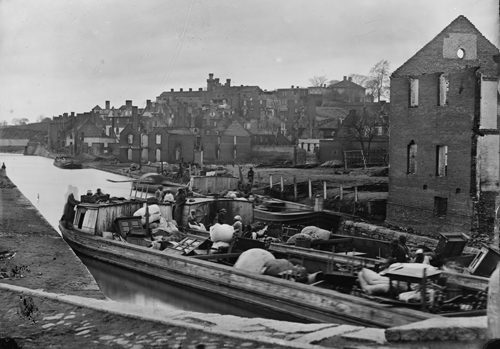
After driving about one mile and a half, we came to an old house before which little fires were kindled, and the pickets sat by and chatted while on “guard.” I leaned forward and asked them some questions.
“Are there people ill in that house — refugees?”
“Yes, ma’am.”
“How long have they been here?”
“Three or four days.”
“How is it then that none of you have reported it at head- quarters. Have you no feeling of pity?”
“Well, ma’am, I have, for one, but this is my first day on duty. I was sent to relieve a boy who is sick and was sent to the hospital yesterday. It was me that sent word to town about them.”
Waiting to say no more, I bade the man drive on, and the next moment alighted before the door.
All the lower rooms were bleak and desolate. The windows were broken, the floors covered with heaps of shattered plastering, sticks, and broken glass. Failing here to find any trace of human life, I mounted the stairs to the second floor, and stood mute with consternation upon the threshold of the wretched chamber.
This, like the room below, was open, bleak and dreary. A faint spark of fire glowed in the midst of a great heap of ashes upon the hearth, and before it, upon the bare, dirt-strewn floor, lay the insensible bodies of a mother and her son—a boy of about 14 years of age. Upon beds made of straw and old clothing, lay two daughters of about 18 and 20, likewise insensible from suffering. They occupied the farthest corner of the room; and in another corner, close to the mother were two more children upon an old bed—prob- ably the only thing they had succeeded in saving from the household wreck — and one was dead — the other too ill to help himself to a cup of water!
My heart ached — my eyes grew dim. For one moment, I breathed despairingly “what can I do, oh, what can I do?” In the next, a willing brain found a way to direct its energies, and I flew down stairs in eager haste, to the driver, who quietly awaited my orders.
“Go back to headquarters and tell the medical director to send me the articles marked down upon this paper,” I said, tearing a leaf from my diary and writing upon it. “You had better take out one of the horses, and have the other fastened securely in the yard. Hasten, for it is a matter of life
and death.”
He obeyed me readily, and in a moment or two after I went up stairs, I heard the horses’ feet clattering down the road in the direction of A———.
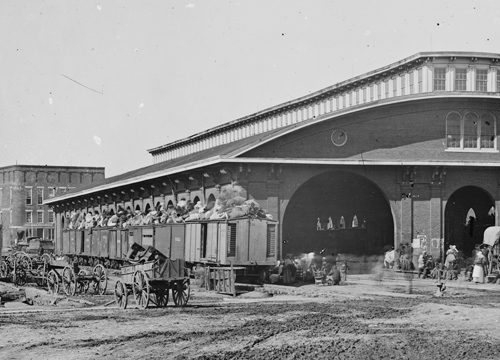
An old adage says “Where there is a will, there is a way,” and I realized its truth that day, if I never did before. There seemed ab- solutely nothing to do anything with, when I came to look about me for means to ac- complish the ends in view. One tin-cup and a water-pail, half full of water, constituted the furniture of the room; and a thorough search through the house and negro quarters, failed to produce anything better than an old tea-kettle with a broken nose, a sauce- pan cracked down one side, and a large tin pan, too full of tiny, rust-eaten holes for any other use than that I put it to—that of relieving the hearth of its too great abundance of ashes.
I found a little negro girl curiously peeping round, and pressed her into service to carry out the ashes, while one of the soldiers on picket duty, kindly cut up an armful of wood to build a fire. This done, I filled the tea-kettle and set it on the logs to heat, while I went out into the field to get a broom. This may sound oddly to the uninitiated, but for the benefit of the ignorant I will say that there is a tall, coarse kind of grass that grows South in the old fields and waste places, called “Broom sedge,” which when gathered and tied together, makes a tolerable broom. It enabled me to sweep a place large enough to draw the sick into, and by dint of much pulling and lifting, I finally succeeded in getting the room free of clay and ashes. The kind-hearted soldier gave me an old blanket he had outside, which I spread upon the floor to lay the dead child upon, covering the little stiffened form from sight while I worked. The mother was soon in his place upon the rude bed, and then began the task of bathing their faces and hands.
By the time this was finished, the boy came back with the articles I had sent for — some hot punch, in bottles — dried apples — bread — tea — sugar, and butter, with some potatoes and onions. I was exultant now. Before this generous supply, want shrank abashed, and the groans of the sick sounded positively sweet to my ears, since they proved that life was not yet extinct. I could not have borne to think they had all died almost within sound of my voice, while I sat in easy ignorance of their fate! That would have proved a bitter cup, to the end of my days.
The punch was administered first, all round — then I made some tea, which with crackers broken into it, I forced them to swallow. In less than an hour, the moans and broken exclamations subsided, and they slept almost peacefully!
Darkness came at last, and I must go home! Other duties as pressing, claimed my attention. But I found an old negro woman who promised to take my place, and watch with them through the night — for a consideration. So, leaving them to her care, I entered the ambulance to return to town, feeling exceedingly weary, but glad and grateful to have been instrumental in relieving suffering of such magnitude.
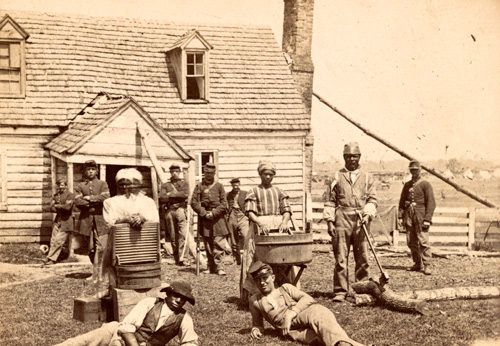
The rain had begun to fall by this time, and came down in a brisk shower as we drove through the streets by the depot. There I observed that the whole platform and build- ing, where a human being could creep for shelter, had been filled up — and some unable to get under a protecting roof, were gathered about fires in the open air, the rain pattering upon the little children, who clung to their mothers’ dresses and wept piteously.
Such experiences as this were not new to me. I was but living over the old time at Corinth; yet it affected me strangely. Perhaps I had grown more thoughtful as I grew older, and through suffering learned to sympathize more deeply with suffering. Not a few of my best beloved and honored friends had fallen, leaving my heart tender for blows that might come hereafter. This was one that wound- ed me. I was touched most deeply, when touched through remembrance of pain. Every heart-pang found a responsive throb in my own.
Lights blazed from every room in the house, and the table looked invitingly tempting, with its array of nice dishes, around which merry faces gathered as the officers came in and took their places; but I could not eat that night.
Those pinched and pallid faces of little wailing children rose up before my eyes, and arrested the food ere it touched my lips. It was with difficulty that I could command my- self long enough to utter an excuse and withdraw from the room, which I did amid smiles and exchanged glances. Even the sweet, earnest face of Gen. Grenville’s wife relaxed as one of the officers remarked jestingly:
“Mrs. ——— found those refugees too much for her appetite, I guess,” — and then a general laugh followed.
Alas! even in the midst of woe, there are few to care for the most wretched of human beings, with a care that can withstand all things.
I sat up until late that night, making a shroud for the dead boy, tears dropping often upon the shining needle as I sewed. …
The following morning I rode out very early, and found a decided improvement in the patients, which encouraged me very much. The death of the child had been properly reported the night previous, and soon after my arrival two or three men were sent to bury it. No tears fell for the little form when it was carried out. No eyes followed it with the wistful tenderness of love, or the mournful outbreaking of sorrow. But, all unconscious of the broken link, the mother, brother and sisters lay there upon the floor, while the sol- diers lifted the coffin and bore it thence, where they buried it among strangers, in an old graveyard, where the gray tombstones bore the traces of an hundred years on their defaced sides. Think of it, mothers, think of that unwept child — its lonely burial, and the condition of that mother who loved her darling children!
For many days I watched over this poor family at the picket lines, until they be- gan to recover — all except the eldest boy. There was no hope for him, and the week after my first visit he died. But the mother and daughters improved rapidly, and after a while could walk about the rooms with a dawning of hope upon their pale faces.
The noble-hearted physician who had attended them through their illness, had proved a great assistance to me in more ways than one during those trying days. Men from his corps of assistants at the hospital had been de- tailed to make bunks for the invalids, and by sewing wagon covers together, and filling them with husks, we succeeded in getting them off the hard floor and placing them in a much more comfortable position.
Others, as badly in need of help, claimed my attention at every turn.
Every vacant house and cellar in town were crowded with them. Provisions were scarce, and to get clothing was utterly impossible, except a few cast-oft garments that I begged from the few loyal ladies of the town. Everything that could be spared from my husband’s and my own ward- robes, as well as Mrs. Grenville’s, was used to clothe the little children until such a time as they could be sent North and properly provided for—a thing which could not be done until they recovered sufficiently to travel. In families of 10 and 15 members, scarcely one could be found well enough to wait upon the sick, and often not one. The most singular fatality seemed to attend them, and none escaped prostration by disease brought on by expo- sure, excitement, and want.
Reader, if you are disposed to look upon this as an overdrawn picture, go to Memphis or Nashville where they come in by thou- sands, and note the condition of that most miserable class of beings called Refugees.
“The Southern Refugees,” October 1, 1864
Become a Saturday Evening Post member and enjoy unlimited access. Subscribe now
